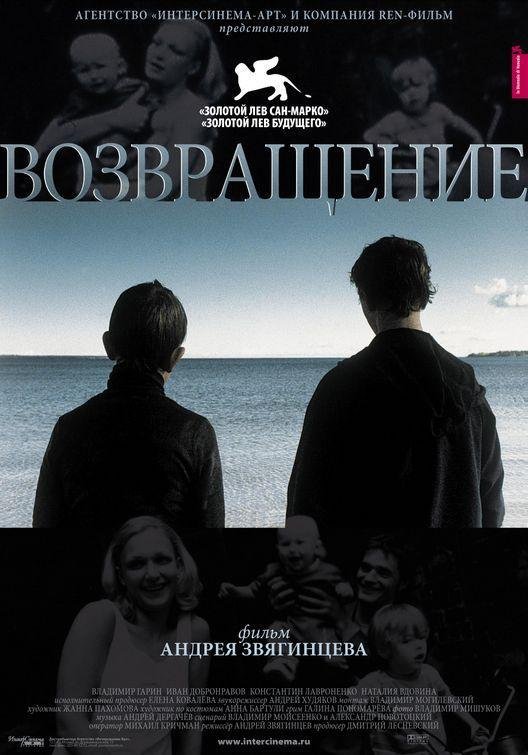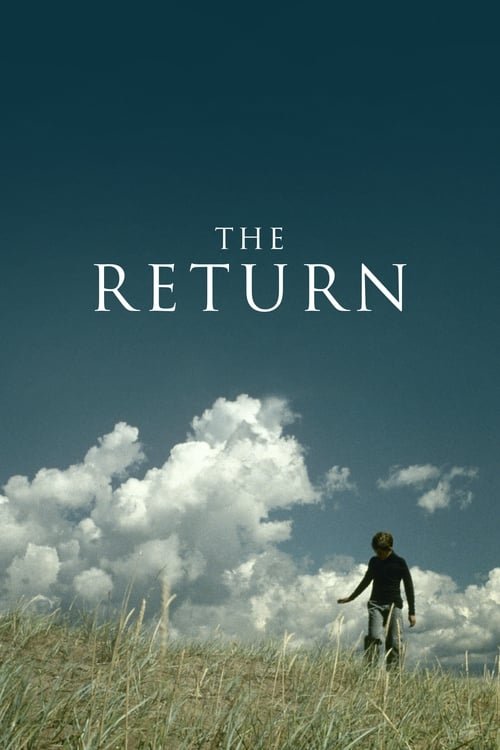The Return (2003): another gem of Russian cinema | otra joya del cine ruso
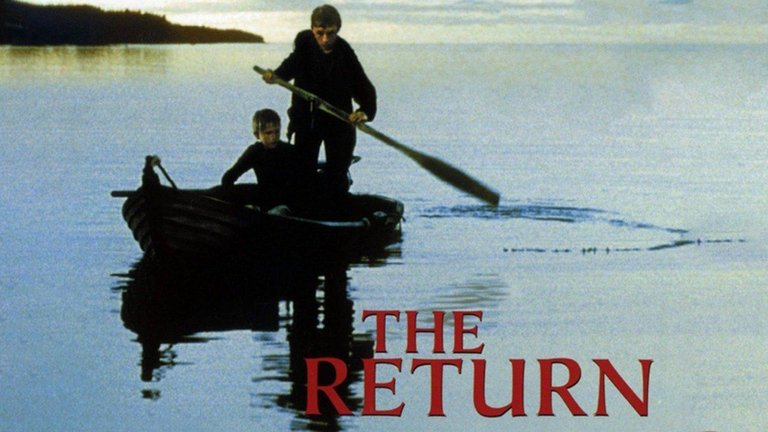
El debut de Andrey Zvyagintsev en la gran pantalla
When we talk about Russian cinema, it's impossible not to talk about Andrei Tarkovsky, probably the most influential director in the history of his country. But there are also other names, some of them still active, who are great exponents of Russian cinema. Among them we can mention Aleksandr Sokurov, Andrei Konchalovski, or my favorite among them, Andrey Zvyagintsev, the mastermind behind Loveless and Leviathan, both reviewed by me in previous months.
Cuando hablamos de cine ruso es imposible no hablar de Andréi Tarkovski, probablemente el director más influyente de la historia de su país. Pero también existen otros nombres, algunos de ellos aún en activo, que son grandes exponentes del cine ruso. Entre ellos podemos mencionar a Aleksandr Sokúrov, Andréi Konchalovski, o mi favorito entre ellos, Andrey Zvyagintsev, la mente maestra detrás de Loveless y Leviathan, ambas reseñadas por mí en meses anteriores.
But before those two cinematographic jewels that won him awards at Cannes, at the Golden Globes and nominations for the Academy Awards, Zvyagintsev had already shown from the very beginning the talented director that he was and is, since his debut in the big screen, Vozvrashchenie (The Return) won various awards throughout the European continent, including the five awards won at the Venice Film Festival, including the Golden Lion for best film, can someone have a better debut?
The Return is about the lives of two pre-teen brothers who live with their mother and grandmother. Andrei is about fourteen years old and Vanya (Ivan) is a couple of years younger. At the beginning of the film we see them play with some adventure companions and we quickly realize that Vania is the more sensitive, but also the more mature of the two. That is why the attitude of the children is so opposite when an event as important as it is surprising occurs: their father, whom they only remembered from an old photograph from when they were both very young, has come home to take them on an excursion. Between some tears, but with great seriousness, the mother agrees to let the man take the children fishing and what seemed like a day-long trip turns into a week full of emotions and experiences, many of them distressing.
Pero antes de esas dos joyas cinematográficas que le valieron premios en Cannes, en los Globos de Oro y nominaciones a los Premios de la Academia, Zvyagintsev ya había demostrado desde sus mismos inicios el talentoso director que era y que es, pues su debut en la gran pantalla, Vozvrashchenie (The Return) obtuvo diversos galardones a lo largo y ancho del continente europeo entre los que destacan los cinco premios ganados en el Festival de Venecia incluyendo el León de Oro a mejor película, ¿puede tener alguien un mejor debut?
The Return trata sobre la vida de dos hermanos preadolescentes que viven con su madre y su abuela. Andréi tiene unos catorce años y Vania (Iván) es un par de años menor. En el inicio de la película los vemos jugar con algunos compañeros de aventuras y nos damos cuenta rápidamente de que Vania es el más sensible, pero también el más maduro de los dos. Por eso la actitud de los niños es tan opuesta cuando acontece un hecho tan importante como sorprendente: su padre, al que sólo recordaban por una vieja fotografía de cuando ambos eran muy pequeños, ha vuelto a casa para llevárselos de excursión. Entre algunas lágrimas, pero con mucha seriedad, la madre accede a que el hombre se lleve a los niños a pescar lo que se insinuaba como un paseo de un día de duración se convierte en una semana repleta de emociones y experiencias, muchas de ellas angustiantes.
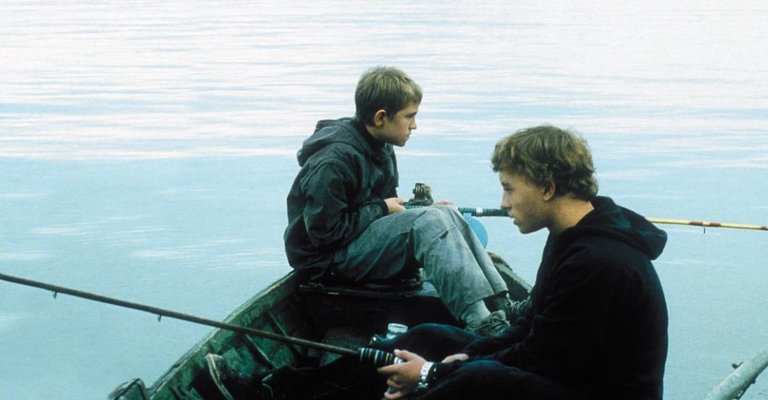
Andrei is happy to share time with his father despite his brusque manner, his lack of tact in saying things and that archaic machismo that he shows in his actions and laconic orders. Vania, on the other hand, is assailed by doubts: is that man really his father? that is, it looks like the one in the photos, but why did he come? why has he come back now after almost twelve years? And these questions multiply when the father takes them even further than promised and goes with them to a remote and lonely island.
Andréi está feliz de compartir tiempo con su padre a pesar de sus modales bruscos, su poco tacto para decir las cosas y ese machismo arcaico que demuestra en sus acciones y sus lacónicas órdenes. Vania, en cambio, es asaltado por las dudas ¿ese hombre es realmente su padre? es decir, se parece al de las fotos, pero ¿a qué vino? ¿por qué ha vuelto ahora después de casi doce años? Y estas preguntas se multiplican cuando el padre los lleva aún más lejos de lo prometido y se va con ellos a una isla remota y solitaria.
The paucity of words of the father added to his prolonged absence means that neither the children nor the spectators manage to know the true intentions of the man. His work is mysterious and raises suspicions, who does he call? Why does the itinerary of the trip change? what has led him to be so harsh? and especially, why go to that lost island? what is he looking for there? Why did he suddenly go looking for his children to take them to that place if, in Vanya's words, he doesn't need them? There are clues that suggest some answers, but several of these questions remain unresolved at the end of the film, which begins as a quiet roadtrip and escalates in drama until it reaches a heavy and surprising climax. It could be said that The Return is an initiation film, of that transit between childhood and adolescence, reinforced by deep and important themes such as family, fatherhood, the absence of affection, loneliness, love (or what we understand of it), the guilt, the grudges and the mystery that constitute the people for whom we do not know them enough. Vanya can be explosive and very emotional in the face of the seriousness of her father and brother, but all the characters manage to show their emotions even if they cannot communicate more clearly verbally.
La parquedad de palabras del padre sumada a su prolongada ausencia provoca que ni los niños ni los espectadores logren saber las verdaderas intenciones del hombre. Su trabajo resulta misterioso y levanta sospechas, ¿a quién llama? ¿por qué cambia el itinerario del viaje? ¿qué lo ha llevado a ser tan duro? y en especial, ¿por qué ir a esa isla perdida? ¿qué busca allí? ¿por qué de repente fue a busar a sus hijos para llevarlos a ese lugar si, en palabras de Vania, no los necesita? Hay indicios que nos sugieren algunas respuestas, pero varias de estas preguntas quedan sin resolver al final de la cinta que comienza como un roadtrip apasible y que va escalando en drama hasta llegar a un clímax pesado y sorpresivo. Podría decirse que The Return es una película de iniciación, de ese tránsito entre la niñez y la adolescencia, reforzada por temas profundos e importantes como la familia, la paternidad, la ausencia de afectos, la soledad, el amor (o lo que entendemos de él), la culpa, los rencores y el misterio que constituyen las personas para quienes no les conocemos lo suficiente. Vania puede resultar explosivo y muy emocional frente a la seriedad de su padre y su hermano, pero todos los personajes logran mostrar sus emociones aunque no puedan comunicarse verbalmente de una forma más clara.
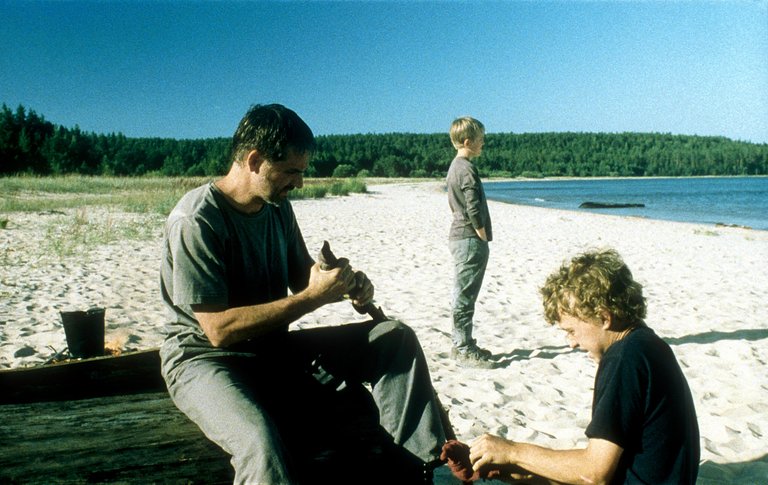
Andrey Zvyagintsev's direction is wonderful and doesn't feel like a debut, The Return looks like the work of someone much more experienced. The acting, the script, the editing, everything works very well, but my favorite aspect of the film is the cinematography: those long takes, those weird angles, that cold color palette that reflects not only the emotional distance between the father and his children but is appropriate for capturing the icy beauty of remote Siberian landscapes. There are moments when you want to pause the film and enjoy a shot, a frame, a scene that transmits emotions, messages and symbols (the sea, the rain, the animals). With each new film I see by this Russian director, my admiration for his work increases and since his filmography is quite short, I don't hesitate to quickly visit all the stories that I have yet to see. Did any of you know the name of Andrey Zvyagintsev? Have you seen any of his movies? Which one is your favorite? I read you in the comments.
La dirección de Andrey Zvyagintsev es maravillosa y no parece un debut, The Return parece el trabajo de alguien mucho más experimentado. Las actuaciones, el guión, el montaje, todo funciona muy bien, pero mi aspecto favorito de la película es la cinematografía: esas tomas largas, esos ángulos raros, esa paleta de colores fríos que refleja no sólo la distancia emocional entre el padre y sus hijos sino que resulta apropiada para captar la helada belleza de los remotos paisajes siberianos. Hay momentos en que dan ganas de pausar la película y disfrutar una toma, un cuadro, una escena que transmite emociones, mensajes y símbolos (el mar, la lluvia, los animales). A cada nueva película que veo de este director ruso aumenta mi admiración por su trabajo y siendo que su filmografía es bastante breve no dudo visitar prontamente todas las historias que me falta ver. ¿Alguno de ustedes conocía el nombre de Andrey Zvyagintsev? ¿han visto alguna película suya?¿cuál es su favorita? Los leo en los comentarios.
Reviewed by | Reseñado por @cristiancaicedo
Other posts that may interest you | Otros posts que pueden interesarte:
  |
|---|
